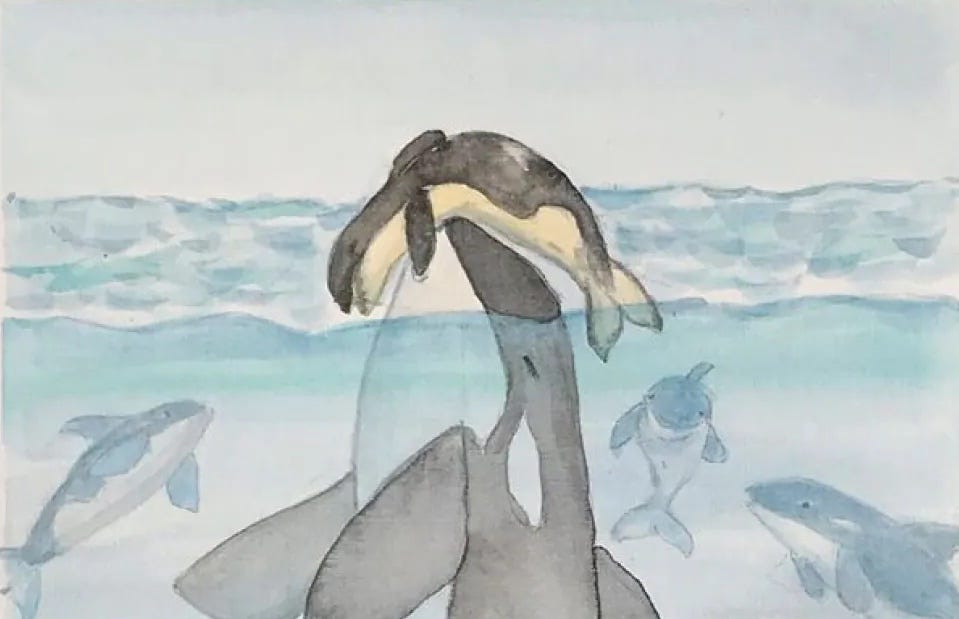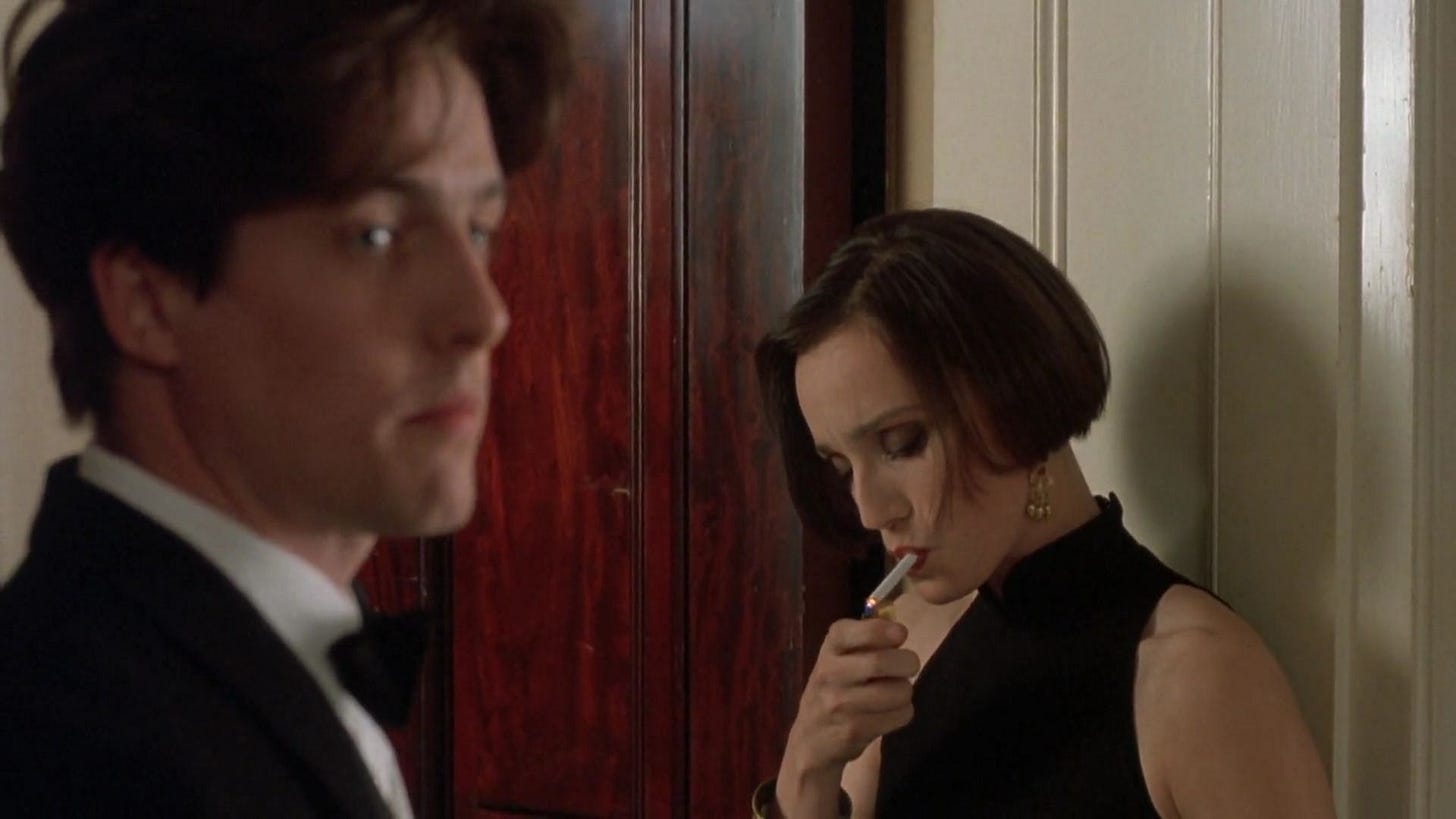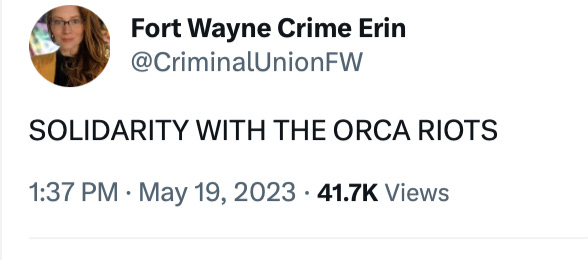The Restless Kind
Orca matriarchy and radical menopause

The Sunday Letter #12
I recently picked up A Horse at Night: On Writing by Amina Cain, a short meditation on reading and writing. In it, Cain reflects on her admiration for authors such as Marguerite Duras, Elena Ferrante, Virginia Woolf, and others, and considers her own reasons for writing. On falling apart, Cain writes:
And writing in a way that is unrefined, vulnerable, not interested in craft, is it also a kind of falling apart, a refusal to keep things together? Sometimes I'm real and sometimes I'm not real. Sometimes I'm alienated from my true nature and sometimes I am my true nature. I don't like the alienation, but to feel it, and then to find it lifted, I wonder if that is valuable too. To know the difference, to not stay stuck.
“To know the difference, to not stay stuck.” I’ve been thinking about what it means to feel embarrassed, regretful, or remorseful. There are days when regrets consume me; relationships gone wrong, loves gone sour, and I wonder if there were things I shouldn’t have done, words I should have kept to myself. Some of my worst secrets are held by people who no longer speak to me and I wonder if I should regret ever letting them in. But it’s been stinging less and less, when I recall that at least I have felt those emotions, can translate it into words on a page. I find that I can’t regret anything, anything that could one day end up part of a story.
*
I visited with a friend recently, and we discussed the fearful paradox of being ambitious and wanting children. She lamented whether her hypothetical future children would have ‘mommy issues.’
“At least they’ll have something to write about!” I teased, though I was fully serious. It’s become (maybe an unhealthy) mantra—at least you’ll have something to write about.
*
I was incredibly moved by Martin Scorsese’s recent Deadline interview in which he described a propulsive desire to create, marred only by a realization that time is closing in:
“The whole world has opened up to me, but it’s too late.” There’s something hopelessly beautiful about chasing the possibilities of one’s own craft, of wishing desperately for more time, knowing it will never come.
I often think of June Callwood, a Canadian journalist and activist who gave her final interview to George Stroumboulopoulos a few weeks before her death in 2007. I was 12 when I saw the interview for the first time, and it radically reoriented brain (specifically, what she says about believing in kindness rather than an afterlife). Fifteen years later and I still revisit the interview often, more recently for what Callwood says about regrets—she has none, other than wishing she’d had more babies. “Now isn’t that a piece of vanity?” she asked. Maybe, but I love it all just the same.
This week’s recommendations
I watched Four Weddings and a Funeral, the 1994 comedy directed by Mike Newell and written by Richard Curtis, who went on to direct the much better Notting Hill in 1999. Love to see a young Kristin Scott Thomas though. Remember her incredible turn on Fleabag? (“It’s not a party until someone flirts with you.”)
I’ve also been catching up on Barry, which is now in its fourth and final season (the series finale will follow Succession’s finale on May 28). In a recent interview, Barry-creator Bill Hader mentioned that Clint Eastwood’s 1992 Western Unforgiven inspires the show. Specifically, how Eastwood’s character spends much of the movie trying to fight his own murderous nature, knowing that it may be the only thing he’s good at. Hader remarks that Eastwood was so well-known for those types of roles that by the time Unforgiven was released, it served as a meta-commentary on what audiences wanted from him, with audiences cheering as he returns to his murderous ways by the movie’s end. I wonder if that’s how Hader feels about Barry, knowing that a portion of his audience will always root for the murderous and abusive lead no matter how many lives he takes. Or will some audience members always see him as a “babygirl” like some portions of the audience treat Kendall and Roman Roy, Succession’s resident power-hungry CEBros who can do no wrong (“Crying on your birthday is a common trope of disaffected womanhood.”)
*
I always enjoy Amil Niazi’s motherhood missives in The Cut, and this one, about facing fertility treatments with two young children, was no different:
I feel like an imposter, like I shouldn’t be here or that I’m being selfish or greedy for wanting more of something I’ve already been given. Especially now, considering, you know, the state of the world. It’s not what you’d call logical, but then again maybe nothing is when it comes to kids.
From The New York Times, “The Mother Who Changed: A Story of Dementia,” a wrenching story about two daughters who must reckon with their mother’s changing life post-diagnosis. What of the “then-self,” before dementia, and the “now-self” after it? When it comes to honouring the wishes of a parent, which ‘self’ should the child recognize?
Kris and Juli didn’t understand how a woman who didn’t know up from down could remember to hate her own daughters, unless someone was reminding her to. “What mother wants to get old without their family around them?” [she] asked me, tearfully.
I loved this GQ interview with Jemima Kirke about the recent Girls resurgence: “I think our underlying, unspoken hope was that people would become more slutty. More reckless. Not reckless, reckless is the wrong word because it implies danger. But be less precious about sex.”
Charlie Squires from evil female on seeing the humanity in their attacker:
I worry that many people do not understand that strangers are real human beings. I think they know it intellectually, and they know that they should think it, and they especially know they have to say it. But I worry that people do not understand that the people they walk past or read about in the New York Post or watch on vertical iPhone videos are real people, people who can hear the blood pounding in their ears and people who can feel the weight of humidity when it hangs heavy in the air in August and people who know the strangely warm crawling of hunger when their stomachs are empty.
And finally, a gorgeous eulogy for a complicated father, from Dronme: “I need instructions, clear and concise and numbered, that tell me what to do with my time right now. But everyone keeps telling me that there is no timeline, no right or wrong way to grieve.”
*
My husband and I are big fans of what we call “Animal News,” so this headline caught my attention: “Orcas have sunk 3 boats in Europe and appear to be teaching others to do the same. But why?” This aggression is a recent event, according to researchers, who believe that “a traumatic event may have triggered a change in the behaviour of one orca, which the rest of the population has learned to imitate.”
This news brought to mind Tahlequah, also known as J35, an orca who spent 17 days in 2018 carrying her dead calf in a “tour of grief.” I recall the daily news about J35 and how it felt like a cross-species display of shared mourning. Some better news, though: Tahlequah has since given birth again, and her matriarchal ‘pod’ is in better condition than in previous years. “There is hope in our images,” one researcher notes, “But it is fragile.”

Did you know that toothed whales are the only non-human animals that experience menopause? Other social creatures, like elephants, continue having children into the end of their lives, so why don’t humans? Evolutionarily speaking, menopause doesn’t really make sense, though of course it’s a reductive question in itself: why live if you can’t reproduce? Setting the dubious foundations of the question aside, researchers set out to study what’s known as “The Grandmother Effect,” in order to determine whether having non-childbearing relatives around to help raise offspring has a measurable effect on a species’ young ones. And sure enough, studies showed that humans, elephants, and killer whales (also known as orcas) all benefit from having their grandma’s around; but that still didn’t explain why we go through menopause. It might have to do, partly, with our longer lifespans. But the research also shows that a “post-reproductive” grandma orca can help to ensure the survival of her own line by giving her kids a chance to reproduce and raise their own children without having to compete for her resources.
Female elephants and orcas both mate with males from outside their families, but return to their mother’s family to raise their children with their own relatives. In adulthood, female elephants stay with their mother’s herd, but all orcas, male and female, stay with their mother’s pod. And over the course of a matriarchal whale’s life, her pod grows with her own children and grandchildren, meaning that “more of her genes are shared by the individuals around her, so she has more motivation to sacrifice her reproductive chances to ensure the survival of her pod.” This doesn’t happen for elephants; an elephant matriarch will have less close relatives in her herd, so her genes have a better chance of survival if she continues to reproduce late in life. And maybe she doesn’t want to be defined entirely by her reproductive capabilities either!
There may be other reasons for The Grandmother Effect, such as the value of an elder whale’s knowledge about salmon behaviour, or their ability to nurture their grandchildren without worrying about their own young. And the dwindling orca population needs all the help it can get. As BBC News reports, rearing a son significantly reduces a female killer whale's chance of reproducing in the future, making it a “lifelong sacrifice” to have male offspring.
Could a greater understanding of The Grandmother Effect really provide “a radical re-imagining of the evolutionary value of menopause?” After all, female killer whales don’t fade into obscurity or death after menopause: they become the pod leaders.
I’ll leave you with a glorious Substack post celebrating the arrival of post-menopause by Mona Eltahawy:
If I were a postmenopausal killer whale, I would be the outcast, transient kind. The restless kind. The kind that hunts seals and eats their livers.
I like to think that there is a postmenopausal transient killer whale out there in the Pacific Northwest, where they roam and I once lived, who imagines that were she a postmenopausal human, she would be the restless kind.
Reading: “I’ve been in more of a revisiting mood as far as reading goes—I’ll pick up Speedboat by Renata Adler when a certain mood strikes, The Lover by Duras, any Toni Morrison, always have Margaret Atwood on the go (if anyone is looking for a weird, immersive, slow burn fever dream of a summer read, pick up Surfacing by her—preferably a hardcover or a ~fragrant~ old paperback if you can find one!)—lately it’s been a period of flipping between pages I’m already acquainted with. For poetry, I’ve been rereading The Black Unicorn by Audre Lorde, The Essential June Jordan, She Had Some Horses by Joy Harjo. Next up is August Blue by Deborah Levy and I’ve just begun reading Dykette by Jenny Fran Davis.”
Watching: “I recently watched Palm Trees and Power Lines, which reminded me of a horror movie on so many levels. I really enjoyed Alice, Darling—it was filmed in an area where I spent summers as a kid, and there’s always something about seeing an Ontario summer on film that reels me in. The contrast of setting vs. tone reminded me of Firecrackers, which is also a great film. I feel like these three movies are in conversation with each other. A sisterhood, a trinity in some way. It would be interesting to watch them all in succession one afternoon, during a heatwave.”
Listening: “I’ve been listening mostly to music that won’t distract me too much while I’m writing—lots of ambient, random stuff from Spotify.”
Life, etc: “It’s such a beautiful season, everything blooming. I’m enjoying the lily of the valley and lilac, cutting them and making bouquets. I’m enjoying the ephemeral.”
P.S. You can find Emma on Instagram and here on Substack at Girls on the Page !







Thank you for the shout out ! And such a great list <3
you really knocked it out of the park this week! now i’m going down the menopause rabbit hole--its not the end of something, nor a withering, but a making space for and a blooming of a different and important kind of generation.